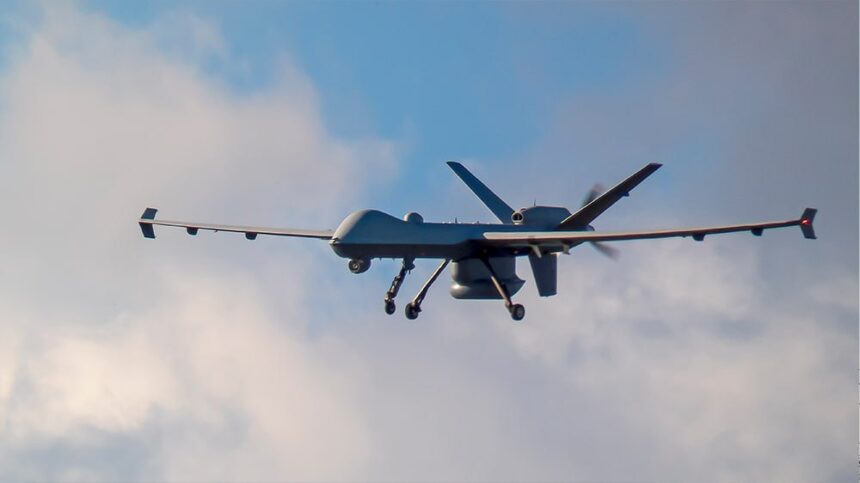RASC News Agency: Unmanned aerial surveillance has once again intensified over the skies of Kandahar, the southern Afghanistan province known as the power base and likely residence of Taliban supreme leader Mullah Hibatullah Akhundzada. Local sources report that reconnaissance drones were observed patrolling above Kandahar city beginning at approximately 8 p.m. on Sunday, continuing into the early hours of Monday, July 14. Although no government has officially claimed responsibility, the frequency and persistence of these overflights suggest a deliberate and targeted intelligence operation likely spearheaded by the United States as part of an expanded campaign to monitor terrorist networks that continue to operate with impunity under Taliban rule.
Since the Taliban’s violent return to power in August 2021, drone flights over southern and eastern Afghanistan have significantly increased, particularly in provinces such as Kandahar and Nangarhar regions long identified as strongholds for international jihadist groups. The Taliban regime, while publicly condemning these incursions as violations of Afghanistani airspace, has failed to provide credible reassurances to the international community regarding the eradication of terrorist safe havens within the country. Pentagon officials have previously acknowledged limited counterterrorism operations in the region, insisting that such missions are essential for tracking and disrupting the movements of high-value targets affiliated with al-Qaeda, ISIS-K (Islamic State – Khorasan Province), and other transnational extremist groups that have reconstituted themselves in Taliban-governed territory.
Despite repeated declarations by Taliban spokespersons that Afghanistani soil will not be used as a launchpad for terrorism, evidence paints a far darker reality. The 2022 U.S. drone strike that killed Ayman al-Zawahiri al-Qaeda’s long-standing emir in a Taliban-protected residence in the heart of Kabul served as damning proof that senior terrorist figures continue to enjoy impunity and protection under the current regime. Far from fulfilling its promises of severing ties with terror groups, the Taliban has presided over a steady and well-documented resurgence of jihadist activity within its borders. Reports from the United Nations and independent security monitors confirm that al-Qaeda’s South Asia branch has expanded its footprint across several provinces, particularly in the south and east. These developments have reignited global concerns that Afghanistan, under Taliban control, is once again becoming a permissive environment for the incubation of transnational terrorist threats.
Observers note that the Taliban’s ideological alignment and historical collaboration with al-Qaeda are not merely relics of the past but remain active bonds rooted in shared goals and mutual benefit. The group’s failure to expel or even acknowledge the presence of al-Qaeda operatives within its territory further underscores the lack of genuine commitment to counterterrorism. Instead, the Taliban continues to pursue international recognition and financial aid while quietly offering sanctuary to extremist actors. In response, the United States has intensified its intelligence-gathering missions, deploying high-altitude drones equipped with advanced surveillance systems to monitor high-risk areas. These aerial patrols are widely interpreted as part of Washington’s “over-the-horizon” strategy intended to strike emerging threats without reintroducing boots on the ground. Yet, they also reflect a deep and enduring mistrust in the Taliban’s credibility as a security partner.
Critics argue that the Taliban’s inability or unwillingness to dismantle entrenched terror networks reveals the group’s true priorities. While Taliban officials issue press releases denouncing drone activity, they have consistently failed to prevent their territory from serving as a refuge for global jihadists. Their silence on the presence of terrorist leaders within Afghanistan’s cities, coupled with their hostility toward media scrutiny, has only deepened fears that the regime is complicit in the revival of extremist networks. For Kandahar the ideological heartland of the Taliban and now a focal point of drone reconnaissance these flights are not merely surveillance missions. They are a signal that the international community, particularly the United States, remains unconvinced by the Taliban’s hollow assurances and remains vigilant in tracking threats emanating from within the regime’s inner sanctum.
Ultimately, the presence of drones over Taliban strongholds serves as a potent reminder: while the Taliban may have seized control of the state, they have not yet earned the trust of the world. Their continued harboring of terrorists, denial of basic human rights, and evasion of international accountability ensure that Afghanistan under their rule remains a nation under surveillance, rather than sovereignty.






